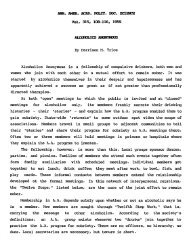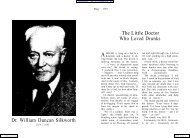hence, indeed, its apparent strength the violence <strong>of</strong> a compressed force. If we lookmore closely at the dipsomaniac, we shall see that it is also a rejection and runningaway—in short, unmistakable fear. For his secret is not that he makes for drink andtakes delight in it as desirous people make for and take delight in that which theydesire. Of delight there is very little in his life, and as his dipsomania grows he cannotbe said even ordinarily to like drink, still less to delight in it. But as his dipsomaniagrows, there is something which does grow along with it and proportionately to it,and it is that something which explains it. It is his fear or even horror, <strong>of</strong> life without drink.That life is a wild beast which pursues him, and his dipsomania is just a runningaway from it. He desires or makes for drink only in the sense in which we make fora refuge; drink is for him a refuge from life. His repetition <strong>of</strong> the doses is the actionnot <strong>of</strong> a desirous lover but <strong>of</strong> a coward desperately defending a position with arepeating rifle against an oncoming foe.We may sum up by saying that greed is diseased desire. Diseased desire isimpure desire—that is, desire mixed with its contrary, fear. In its extreme ormaniacal form it is almost wholly fear masquerading as desire. <strong>The</strong> marks <strong>of</strong> diseaseare: compulsiveness, violence, narrowness, repetitiveness, monotony, inelasticity,pleonectic grabbing, isolation, tyranny, defensiveness, contraction, withdrawal,rejection.SELLING ONE’S SOULDipsomania, cleptomania morphinomania, onanomania, nymphomania,satyromania—these and some other diseased desires like them have received the title<strong>of</strong> mania <strong>of</strong>ficially or technically.* But common speech, which is largely moulded bythe common perception <strong>of</strong> resemblances important for ordinary life, has fixed uponthe similarities between these and far more widespread desires, and has extendedthe title to the latter.Commonly we may call a mania any desire when we are “attached” to its object,or have “set our heart” upon its object, or have “sold our soul” to or for it. We maysell our soul to or for anything—power, riches, glory, skill, knowledge, “goodness”even, in the sense <strong>of</strong> a fixed code deciding what shall stand for goodness. <strong>The</strong> liferesulting from selling our soul may be a very rich one reckoned quantitatively—that is to say, it may cover a very large field <strong>of</strong> manifold activities. But somewhereor other in it there is something that is starved, or subjugated, or treated merelyas a means to that for which the soul has been sold. That something may be theimagination in the busy man <strong>of</strong> affairs or in the scholar; or it may be the intellect inthe man <strong>of</strong> feeling; most generally it is something in the affections. Whatever it is,it marks a shrinking from developing to the full all the possibilities <strong>of</strong> that life; it is asign <strong>of</strong> impurity or <strong>of</strong> the admixture <strong>of</strong> fear, and acts like a piece <strong>of</strong> dead flesh upona large and fine body, gradually infecting its quality or lifeblood. It is that infecting* For an illuminating account <strong>of</strong> them see Fritz Kunkel in Charakter, Leiden und Heilung, section 17.50
impurity which is denoted by the sinister phrase “selling our soul.” What we sell isour very life; what we buy comes to stand for life and becomes, like drink, a refugefrom life.PARTICULAR DESIRESBut every particular desire, whether called mania or not, is by its very nature,it would seem, diseased or impure because mixed with fear. A desire, I have said, isa seeking or making for life more abundant, an adventuring forth, an expanding. Imust modify that statement by pointing out that a particular desire (a desire for aparticular thing or class <strong>of</strong> thing) is only a making for those possibilities <strong>of</strong> life whichinclude its own particular satisfaction; it is at the same time a shunning or rejection<strong>of</strong> all those possibilities, far greater in number, which do not allow <strong>of</strong> its satisfaction,and it is a rejection <strong>of</strong> them however excellent they be in themselves. Thus, if Ihave the desire to do something (say to climb a mountain or obtain a job) or to besomething (say to be a scholar), I naturally tend to make for those conjunctions <strong>of</strong>circumstances which mean the realisation <strong>of</strong> that desire; but, unless I am correctedby something else, it may be by another desire, I no less naturally tend to shun,fear, deplore all those conjunctions which mean that my desire will not be realised.Since the number <strong>of</strong> these conjunctions is vast, it is notorious that every particulardesire is attended by a mighty train <strong>of</strong> fears, worries, suspicions, anxieties. Further,every particular desire, in excluding a vast number <strong>of</strong> conjunctions, by that veryfact is at war with a vast number <strong>of</strong> other desires—all those which make for theseexcluded conjunctions—and seeks to establish a tyranny over them.* Thus, to takeone example, if I desire to obtain a pr<strong>of</strong>essorship, I am apt to shun all activitiesand thwart all desires, however excellent, which might interfere with my success. Itend also to be afraid, jealous or suspicious <strong>of</strong> all possible rivals and to thwart theiractivities and desires.If fear, a negative thing, is present in desires which present themselves as positive,and constitutes their negativity, it is still more likely to be operative in attitudes whichdo not even claim to be anything but negative—attitudes like dislike, hatred, anger,annoyance, indignation, resentment, scorn. That there is fear (as the term has beendefined here) in them when they are what I have called negative Godfeeling, isobvious, for then they constitute preeminently a running away from life, since God isabsolute life. But do they constitute a running away from life when they are directedagainst evil, disease, death itself ? <strong>The</strong>y do, for they constitute an abandonment orrejection <strong>of</strong> the effort to heal or quicken what is diseased or dead, and that effortis the attribute <strong>of</strong> absolute life or omnipotence. It is notorious that the strength <strong>of</strong>the feeling in these attitudes is in direct ratio to our shrinking from exertion, and ininverse ratio to our readiness for effort and to our confidence. It is true that when we* What I have called the impurity <strong>of</strong> particular desires is the phenomenon which is covered, but alsolargely misinterpreted, under the term “ambivalence” in textbooks <strong>of</strong> Psychology.51
- Page 1 and 2: The Philosophyof Courageor The Oxfo
- Page 3 and 4: fear of being creative and being ou
- Page 5 and 6: truly were. There was also a spirit
- Page 7 and 8: Comparison with Bill W. and A.A.on
- Page 9 and 10: I must embrace my own feeling of so
- Page 11 and 12: Alcoholism and addiction asforms of
- Page 13 and 14: specifications as to how that is to
- Page 15 and 16: perfect serenity. By shutting off a
- Page 17 and 18: The act of total surrender allows t
- Page 19 and 20: this. But you do not have to be any
- Page 21 and 22: NOTES ON CHAPTER 3. SHARING OR SPRE
- Page 23 and 24: [chapter 3, section II]If I am succ
- Page 25 and 26: NOTES ON CHAPTER 4. CHANGING SOCIET
- Page 27 and 28: The Oxford Group and Alcoholics Ano
- Page 29 and 30: view Press, 2000) 28. “Sick origi
- Page 31 and 32: INTRODUCTIONThe world is going mad,
- Page 33 and 34: TRUE RELIGIONWhy are you cowards, p
- Page 35 and 36: CONTENTSIntroductionTrue Religion31
- Page 37 and 38: to do the same for the term “pixi
- Page 39 and 40: the power which is God or from God.
- Page 41 and 42: God. The reader who is asked to con
- Page 43 and 44: these qualities and on the relation
- Page 45 and 46: y the power of God. But it is not n
- Page 47 and 48: IIMYSELFI AM NOT GODThe objection l
- Page 49: DISEASE OR FEAR: MANIAWhat is wrong
- Page 53 and 54: occasions when he is threatened wit
- Page 55 and 56: IIIHEALTH OR PASSIONPURE DESIRESinc
- Page 57 and 58: PASSION AND PARTICULAR DESIRESNot b
- Page 59 and 60: Chapter 2DEMONSTRATION BY EXPERIMEN
- Page 61 and 62: to desire passionately to be health
- Page 63 and 64: Conformity with the commandment aga
- Page 65 and 66: IITHE CRUCIAL EXPERIMENT ORTHE QUIE
- Page 67 and 68: and hypocrisy, that judged by absol
- Page 69 and 70: not meant; that the fool was not as
- Page 71 and 72: hands I commit my spirit.”With th
- Page 73 and 74: that God the Highwayman is really a
- Page 75 and 76: I obey guidance to go and see a man
- Page 77 and 78: foreseen or seen as I have represen
- Page 79 and 80: AN ILLUSTRATIONBecause the checking
- Page 81 and 82: IVTHE QUITE TIME AND THEH WORKING D
- Page 83 and 84: NEED FOR AN ADEQUATE PSYCHOLOGY OF
- Page 85 and 86: only to poets. But to judge from on
- Page 87 and 88: For the first time passion or the r
- Page 89 and 90: HEAVENWhat I have come to is Heaven
- Page 91 and 92: For Heaven is now no longer a dream
- Page 93 and 94: I am contiguous with other selves i
- Page 95 and 96: expanses of self, seem to be experi
- Page 97 and 98: IITHE STRATEGY OF THE LARGER SELFGO
- Page 99 and 100: FEAR CONCEALS FEARNow the procedure
- Page 101 and 102:
exposure of the “universe.” Tru
- Page 103 and 104:
IIITHE STRATEGY AGAINST THE LARGER
- Page 105 and 106:
his own. The miracle of self-consci
- Page 107 and 108:
usiness, for government, for the na
- Page 109 and 110:
and then make him follow its course
- Page 111 and 112:
importance to the Company. However,
- Page 113 and 114:
of smugness, self-satisfaction and
- Page 115 and 116:
PREOCCUPATION WITH SYMPTOMSWhen “
- Page 117 and 118:
channel through which collective gu
- Page 119 and 120:
abyss and the area coincide. It is
- Page 121 and 122:
IVTHE ECONOMIC PROBLEMTHE ECONOMIC
- Page 123 and 124:
that need or greed, and not the cap
- Page 125 and 126:
VPOLITICAL SCIENCEUNCHANGED POLITIC
- Page 127 and 128:
it, by blaming other people instead
- Page 129 and 130:
VIPHILOSOPHY AND ARTTHE SINS OF THE
- Page 131 and 132:
For expression or projection is the
- Page 133 and 134:
DENYING THE SEPARATION BETWEEN THE
- Page 135 and 136:
which the errors are designed to pr
- Page 137 and 138:
A PERSONAL NOTEThe philosophy given
- Page 139 and 140:
the formation of sacred stereotypes















